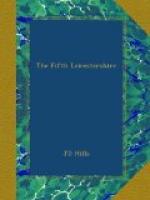Between the Railway Cutting at “Hill 60” and the Comines Canal further south, the lines at this time were very close together, and at one point, called Bomb Corner, less than 50 yards separated our parapet from the Boche’s. This sector, containing trenches “35” at Bomb Corner, “36” and “37” up to the Railway, was held by the 1st Norfolks of the 5th Division, who were finding their own reliefs, and, with one company resting at a time, had been more than two months in this same front line. On the 11th July the Boche blew a mine under trench “37” doing considerable damage to the parapet, and on the following night “36” was similarly treated, and a length of the trench blotted out. The night after this we came in to relieve the Norfolks, who not unnaturally were expecting “35” to share the same fate, and had consequently evacuated their front line for the night, while they sat in the second line and waited for it to go up in the air. Captain Jefferies with “D” Company took over “35,” while the two damaged trenches were held by “B” Company (Capt. J.L. Griffiths). “A” and “C” held a keep near Verbranden Molen—an old mill about three hundred yards behind our front line—and Battalion Headquarters lived in some dug-outs in the woods behind “35.” Behind this again, the solitary Blaupoort Farm provided R.A.P. and ration dump with a certain amount of cover, though the number of dud shells in the courtyard made it necessary to walk with extreme caution on a dark night. In spite of the numerous reports of listening-posts, who heard “rapping underground,” we were not blown up during our four days in residence, and our chief worry was not mines, but again whizz-bangs. One battery was particularly offensive, and three times on the 15th Capt. Griffiths had his parapet blown away by salvoes of these very disagreeable little shells. One’s parapet in this area was one’s trench, for digging was impossible, and we lived behind a sort of glorified sandbag grouse butt, six feet thick at the base and two to three feet at the top, sometimes, but not always, bullet-proof.
One or two amusing stories are told about the infantry opposite “33,” who were Saxons, and inclined to be friendly with the English. On one occasion the following message, tied to a stone, was thrown into our trench: “We are going to send a 40 lb. bomb. We have got to do it, but don’t want to. I will come this evening, and we will whistle first to warn you.” All of this happened. A few days later they apparently mistrusted the German official news, for they sent a further message saying, “Send us an English newspaper that we may learn the verity.”




